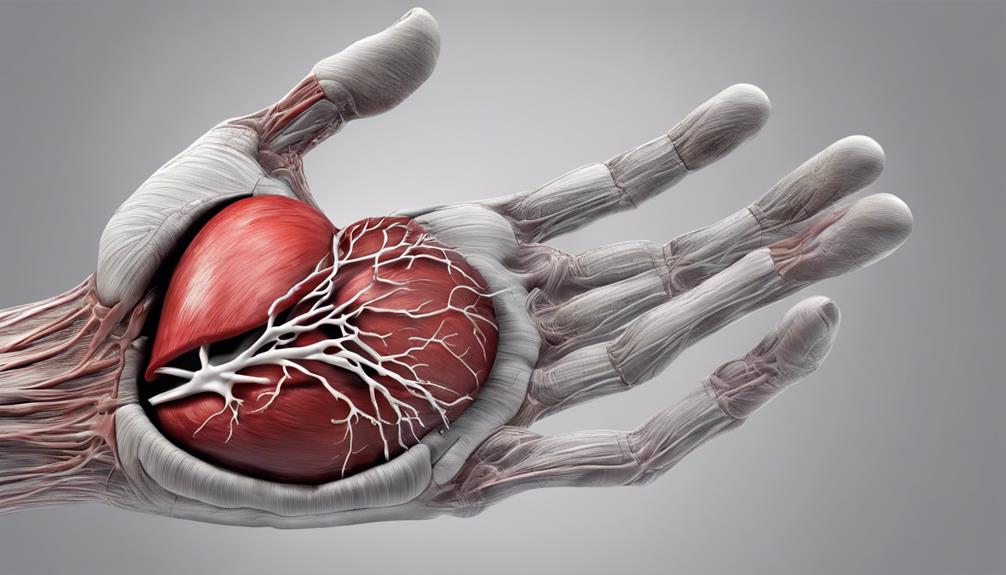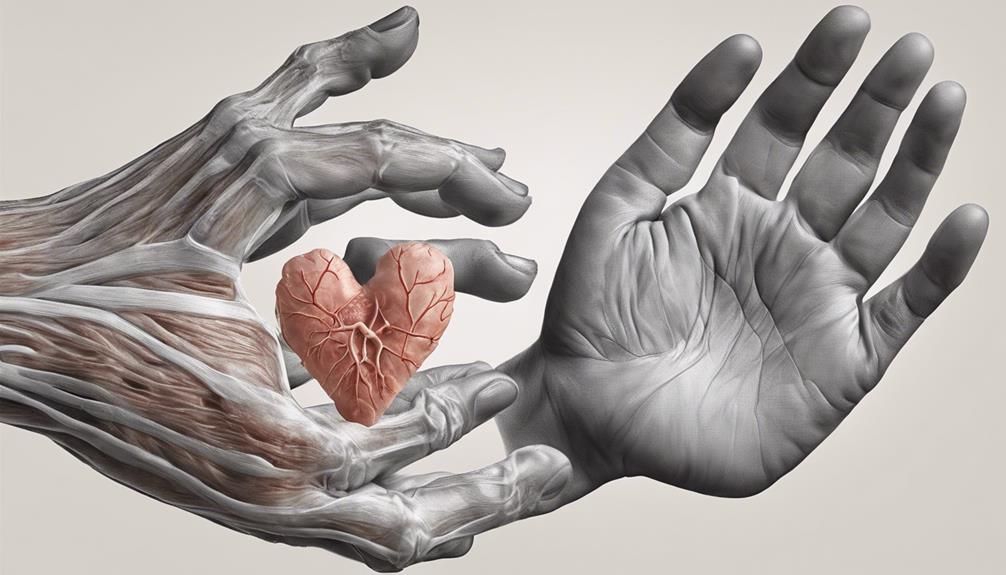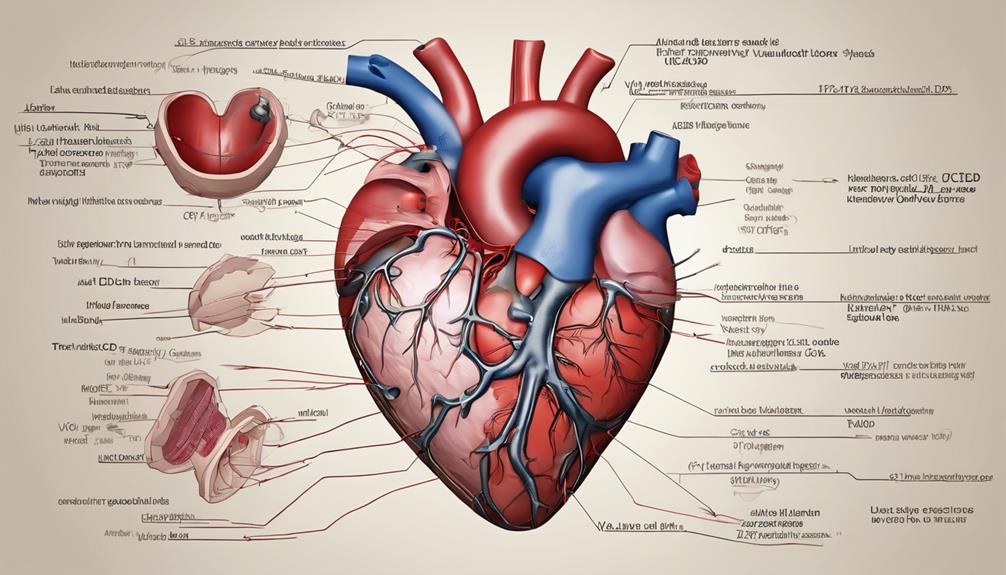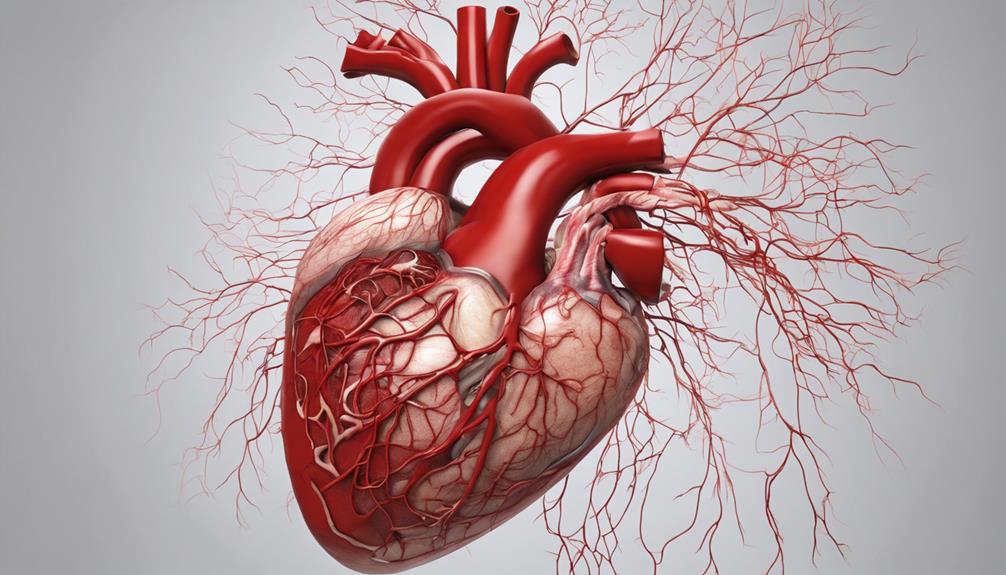When delving into the complexities of Dupuytren’s contracture and the diverse elements of heart disease, an intriguing link is revealed. This possible association between these separate conditions inspires us to explore how they may overlap and impact one another.
By unraveling the enigma surrounding Dupuytren's contracture and heart disease, we may uncover crucial insights that could revolutionize the approach to patient care and treatment. The implications of this relationship are profound, hinting at a deeper connection that warrants further investigation to enhance our understanding and management of these health issues.
Key Takeaways
- Shared risk factors like diabetes and smoking contribute to both conditions.
- Coordinated care between specialists crucial for managing Dupuytren's and heart disease.
- Timely diagnosis and proactive management improve outcomes.
- Monitoring shared symptoms and tailored treatment plans optimize patient well-being.
The Link Between Dupuytren's Contracture and Heart Disease
The association between Dupuytren's contracture and heart disease warrants a closer examination due to shared risk factors and potential implications for patient care. Studies have shown that patients with Dupuytren's contracture may face an elevated risk of developing cardiovascular issues like coronary artery disease. This connection suggests a deeper interplay between these seemingly unrelated conditions.
Common risk factors such as diabetes, smoking, and genetic predisposition contribute to the development of both diseases, underlining the importance of a holistic approach to healthcare. By understanding the link between Dupuytren's contracture and heart disease, healthcare providers can offer more targeted interventions to manage these conditions effectively. Monitoring heart health in patients with hand contractures becomes crucial in providing comprehensive care and early intervention.
Recognizing and addressing these shared risk factors early on can lead to improved patient outcomes and better overall health management. The synergy between Dupuytren's contracture and cardiovascular issues emphasizes the necessity of a coordinated and proactive medical approach.
Understanding the Cardiovascular Risks

Exploring the cardiovascular risks associated with Dupuytren's contracture reveals important insights into the interplay between these conditions and their shared risk factors. Patients with cardiovascular issues face an increased mortality rate when Dupuytren's contracture coexists, emphasizing the significance of understanding and managing these risks effectively. Common risk factors contribute to the development and progression of both conditions, necessitating comprehensive care strategies tailored to each individual's needs.
- Shared Risk Factors: Smoking, diabetes, and hyperlipidemia are prevalent risk factors that can exacerbate both Dupuytren's contracture and cardiovascular diseases.
- Increased Mortality: Patients with cardiovascular problems and Dupuytren's contracture have a higher risk of mortality, underscoring the importance of proactive management.
- Integrated Care: Coordinated care involving hand specialists and cardiologists is essential to address hand contractures and cardiovascular health simultaneously.
- Comprehensive Treatment Plans: Understanding the link between Dupuytren's contracture and heart disease aids in devising holistic treatment plans for improved patient outcomes.
Implications for Diagnosis and Treatment
Understanding the implications for diagnosis and treatment of Dupuytren's contracture in conjunction with heart disease requires a comprehensive approach to address the interplay between these conditions and ensure optimal patient outcomes.
Patients presenting with Dupuytren's contracture and cardiovascular disease symptoms may face challenges in receiving a timely and accurate diagnosis due to overlapping manifestations. Healthcare providers must maintain a high index of suspicion for both conditions, especially in individuals with risk factors for cardiovascular disease.
Diagnostic evaluations should be thorough, incorporating assessments for both Dupuytren's contracture and heart issues to prevent delays in treatment initiation. Early detection is paramount, as prompt intervention can lead to better management of the diseases and improved prognosis for patients.
Coordinated treatment plans involving multiple specialists may be necessary to provide holistic care and address the complexities of managing Dupuytren's contracture alongside cardiovascular conditions. Through close monitoring, timely interventions, and tailored treatment strategies, healthcare teams can optimize outcomes for patients affected by these interconnected health concerns.
Research Insights on Dupuytren's and Heart Health

Research insights into the relationship between Dupuytren's contracture and heart health reveal significant implications for patient care and outcomes. Studies have shown a concerning association between Dupuytren's contracture and heart disease, particularly an increased risk of mortality related to conditions like coronary artery disease and myocardial infarction. Case reports have underscored the importance of monitoring individuals with both Dupuytren's contracture and heart issues due to overlapping symptoms. Early diagnosis and management are crucial for optimizing patient outcomes in these cases.
- Dupuytren's contracture patients face higher mortality risks associated with heart diseases.
- Monitoring individuals with both conditions is crucial due to shared symptoms.
- Early detection and management are essential for improving patient outcomes.
- Understanding the link between Dupuytren's contracture and heart health can lead to better treatment strategies and long-term prognosis.
Comprehensive Care Strategies for Patients
Comprehensive care strategies for patients with Dupuytren's contracture and heart disease prioritize coordinated management to address hand contractures and cardiovascular conditions effectively. Health outcomes are optimized through increased care coordination between specialists, ensuring that the progression of hand contractures and heart disease is monitored closely.
Tailored rehabilitation programs play a crucial role in addressing functional limitations in both the hands and heart, ultimately improving the quality of life for individuals facing these conditions. Patients benefit from lifestyle modifications, adherence to medication regimens, and regular follow-up appointments as part of holistic care.
Collaborative efforts between hand specialists and cardiologists result in integrated care plans that cater to the unique needs of individuals with Dupuytren's contracture and heart disease. By implementing these comprehensive care strategies, healthcare providers can significantly enhance the overall well-being and outcomes for patients dealing with the dual challenges of hand contractures and cardiovascular issues.
Frequently Asked Questions
What Diseases Are Associated With Dupuytren's Contracture?
We know that Dupuytren's contracture is associated with various diseases. Studies have linked it to conditions like coronary artery disease and heart issues. Research suggests a potential relationship between Dupuytren's contracture and heart diseases, indicating the importance of monitoring and managing patients with both conditions.
Understanding these associations is crucial for optimizing treatment strategies and improving patient outcomes through comprehensive care and coordination between specialists.
Is Dupuytren's Contracture Related to Heart Disease?
We think it's important to explore potential links between health conditions. Heart disease, a leading cause of mortality globally, deserves special attention.
Research suggests an association between Dupuytren's contracture and heart disease, particularly coronary artery disease and myocardial infarction. Understanding these connections could enhance patient care strategies.
Monitoring patients with both conditions is vital for comprehensive health management. By delving deeper into these relationships, we can provide more holistic and effective care.
Does Dupuytren's Contracture Affect Life Expectancy?
Yes, Dupuytren's contracture can affect life expectancy. Research shows that patients with this condition have increased mortality rates, impacting how long they live.
The risk becomes evident about 12 years after diagnosis. Common causes of death in Dupuytren's patients include cancer, cardiovascular disease, diabetes, liver disease, and suicide.
Making lifestyle changes within a 12-year window may help prevent premature mortality in individuals with Dupuytren's contracture.
Does Dupuytren's Affect Other Parts of the Body?
When pondering potential impacts of Dupuytren's contracture beyond hands, researchers explore systemic effects. Studies hint at links between this condition and broader health concerns, prompting investigations into other body areas.
Understanding these potential connections is crucial for comprehensive care and management. Research into Dupuytren's implications outside the hands is ongoing, shedding light on its systemic reach and possible associations with various health conditions.
Conclusion
In conclusion, the intertwining of Dupuytren's contracture and heart disease serves as a poignant reminder of the intricate connections within the human body.
Just as the hands clasp together, so too do these conditions, urging us to grasp the importance of holistic care and vigilance in managing our health.
By recognizing and addressing these links, we can strive towards comprehensive well-being and improved outcomes for those affected.









